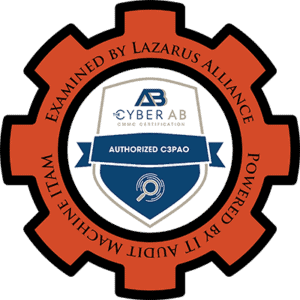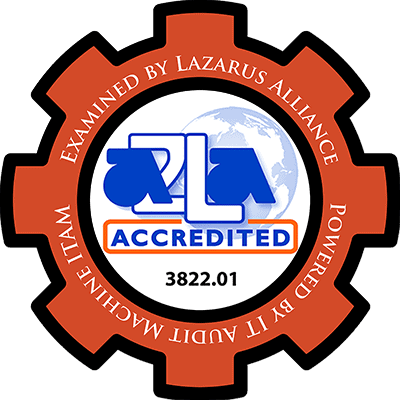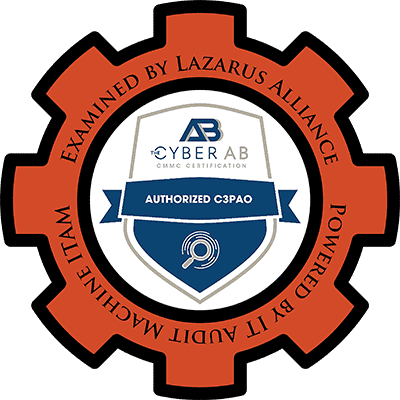CMMC Certification, Level 1 & Level 2 Assessments – Lazarus Alliance is an accredited C3PAO. Call +1 (888) 896-7580 today!
Table of Contents
Toggle
The U.S. Department of Defense (DoD) created the Cybersecurity Maturity Model Certification (CMMC 2.0) to protect Federal Contract Information (FCI) and Controlled Unclassified Information (CUI) across the entire Defense Industrial Base (DIB). Starting in late 2025, CMMC compliance is mandatory for any prime contractor or subcontractor bidding on or performing DoD contracts that involve sensitive data.
Lazarus Alliance is an authorized CMMC Third-Party Assessment Organization (C3PAO) accredited by the Cyber AB. We guide DoD contractors through the entire CMMC journey – from determining your required certification level (Level 1, Level 2, or Level 3) to achieving full certification.
Here’s what working with Lazarus Alliance looks like:
- A complimentary scoping call (+1 888-896-7580) to confirm whether you need Level 1 (self-assessment), Level 2 (third-party certification for CUI), or Level 3 (government-led for high-risk programs).
- A tailored readiness roadmap and gap analysis against the exact NIST SP 800-171 (Level 2) or NIST 800-172 (Level 3) controls you must meet.
- Full C3PAO assessment coordination by our experienced Cybervisor™ teams.
- Certification is awarded the moment you demonstrate the required maturity – with results posted directly to the DoD’s Supplier Performance Risk System (SPRS).
Whether you’re preparing for the 2025–2028 phased rollout or need certification now for an upcoming solicitation, Lazarus Alliance delivers fast, compliant, and stress-free CMMC assessments so you can win and retain DoD contracts without compliance delays.
Cybersecurity Maturity Model Certification (CMMC)
CMMC continues to aim at verifying that DoD contractors and subcontractors implement and maintain cybersecurity practices to protect sensitive data in the Defense Industrial Base (DIB). It builds on standards like NIST SP 800-171 (Rev. 2) and FAR 52.204-21, shifting from self-attestation to verifiable assessments. As of October 2025, requirements are beginning to appear in DoD solicitations, with full rollout phased over three years (through 2028).
The Three CMMC Levels
The levels are tiered based on the type and sensitivity of data handled (FCI for non-sensitive contract info; CUI for sensitive but unclassified info). Each level specifies security requirements, assessment methods, and frequency:
- Level 1: Foundational (Basic Cyber Hygiene for FCI)
- Focus: Protects FCI from basic threats.
- Requirements: 17 basic security controls from FAR 52.204-21 (e.g., limit system access, use antivirus, screen users).
- Assessment: Annual self-assessment, with results posted to the Supplier Performance Risk System (SPRS). No third-party involvement.
- Applicability: For contracts involving only FCI (no CUI). Exemptions apply to commercial off-the-shelf (COTS) items.
- Timeline: Enforceable in solicitations starting late 2025.
- Level 2: Advanced (Intermediate Protection for CUI)
- Focus: Protects CUI against common cyber threats, aligning closely with NIST SP 800-171's 110 controls.
- Requirements: All 110 NIST 800-171 practices (e.g., multi-factor authentication, incident response planning, media protection).
- Assessment: Primarily third-party certification by a CMMC Third-Party Assessment Organization (C3PAO) every three years, with annual affirmations. Self-assessments are allowed for some lower-risk contracts via a Plan of Action and Milestones (POA&M) for minor gaps (must close within 180 days).
- Applicability: For most contracts handling CUI. This is the most common level for DIB organizations.
- Timeline: Third-party assessments begin in October 2026 for higher-risk contracts; self-assessments start in 2025.
- Level 3: Expert (Proactive Defense for High-Risk CUI)
- Focus: Defends against advanced persistent threats (APTs) with enhanced controls beyond NIST 800-171.
- Requirements: All Level 2 controls plus 24 additional NIST 800-172 practices (e.g., advanced threat detection, supply chain risk management, deception techniques).
- Assessment: Government-led assessment by the Defense Industrial Base Cybersecurity Assessment Center (DIBCAC), building on a prior Level 2 C3PAO certification. Every three years, with annual affirmations.
- Applicability: For a small subset of contracts involving highly sensitive CUI critical to national security.
- Timeline: Phased in starting 2026–2027, primarily for select high-priority programs.
Key Components
- Domains and Practices: Organized into 14 domains (e.g., Access Control, Risk Assessment) with capabilities and specific practices. Levels build cumulatively—Level 3 includes everything from Levels 1 and 2.
- Scoring and POA&Ms: For Levels 2 and 3, assessment scores implementation (100% required for full certification; partial scores allowed temporarily via POA&Ms). Level 1 requires all controls to be fully met.
- Affirmations: Senior officials must annually affirm compliance in SPRS throughout the contract lifecycle.
Implementation and Timeline (as of October 2025)
- Phased Rollout:
- Phase 1 (2025): CMMC clauses in ~5–15% of solicitations; focus on self-assessments for Levels 1 and some Level 2.
- Phase 2 (2026): ~20–50% of contracts; third-party Level 2 assessments ramp up.
- Phase 3 (2027+): All applicable contracts; full Level 3 integration.
- Certification Process: Assessments by accredited C3PAOs or DIBCAC; results valid for three years.
- Applicability: All prime contractors and subcontractors handling FCI/CUI; flows down via contract clauses.

CMMC Level 2 Audit Timeline: What to Expect with Lazarus Alliance
The CMMC Level 2 Audit (Advanced/Intermediate) under the Cybersecurity Maturity Model Certification (CMMC) framework is designed for organizations in the Defense Industrial Base (DIB) handling Controlled Unclassified Information (CUI)—sensitive but unclassified data in DoD contracts. It focuses on protecting against common cyber threats through alignment with all 110 NIST SP 800-171 Rev. 2 practices (e.g., multi-factor authentication, incident response planning, media protection).
Unlike Level 1 (self-assessed), Level 2 typically requires third-party certification by a C3PAO like Lazarus Alliance every 3 years, with annual affirmations. Self-assessments are allowed for lower-risk contracts, but third-party audits are standard for most. Plans of Action and Milestones (POA&Ms) permit minor gaps (must close within 180 days), allowing partial scores temporarily.
Lazarus Alliance, as a certified C3PAO, coordinates the full process using our Cybervisor™ teams (experienced in thousands of assessments). They determine your exact needs, conduct evaluations, and award certification upon proving maturity across 14 domains (e.g., Access Control, Risk Assessment). The overall timeline is 3–6 months from prep to certification, depending on gaps. Certifications are valid for 3 years, but annual SPRS affirmations are mandatory.
Key Overview
- Requirements: Full implementation of 110 NIST controls; 100% score needed for certification (POA&Ms for minor issues).
- Assessment Type: Third-party (C3PAO) every 3 years; annual affirmations in the Supplier Performance Risk System (SPRS).
- DoD Rollout Impact: Enforceable starting 2025 (self-assessments for some); third-party audits ramp up in October 2026 for higher-risk contracts (Phases 2–3 through 2028). Non-compliance excludes you from CUI-related bids.
- Cost & Expertise with Lazarus: $20K–$60K+ for full audit (varies by scope; prep support ~$10K–$20K). Their Cybervisor™ teams ensure DoD-aligned efficiency.
Step-by-Step Timeline: What to Expect
Here's the phased process with Lazarus Alliance. Timelines are estimates based on CMMC guidelines and their coordinated approach.
| Phase | Duration | What to Expect | Lazarus Alliance's Role |
|---|---|---|---|
| 1. Preparation & Gap Analysis | 4–8 weeks | - Assess current posture against 110 NIST controls. - Gather evidence (policies, configs, logs) across 14 domains. - Confirm Level 2 applicability (CUI handling; no exemptions for COTS). - Draft POA&Ms for gaps; implement quick wins (e.g., encryption, auditing). | - Free consultation (+1-888-896-7580 or form) to scope needs. - Cybervisor™ team runs readiness review, provides roadmap/templates. - Identify if self- vs. third-party assessment fits. |
| 2. Implementation & POA&M Development | 4–8 weeks | - Roll out controls (e.g., access management, awareness training). - Develop/track POA&Ms for non-compliant items (180-day closure required). - Internal testing to simulate an audit. | - Advisory guidance: Review docs, prioritize fixes. - Cybervisor™ experts consult on NIST alignment; flag escalation risks to Level 3. |
| 3. Third-Party Assessment Execution | 2–4 weeks | - On-site/remote audit: Lazarus team evaluates evidence, interviews staff, tests systems. - Score practices (partial OK via POA&Ms); covers all domains. - No major disruptions—phased over days/weeks. | - Schedule & lead full C3PAO audit with Cybervisor™ assessors. - Real-time feedback; handle any immediate issues. |
| 4. Results, Certification & SPRS Posting | 1–2 weeks | - Receive final report/score; close any final POA&Ms. - Post to SPRS; senior official affirms. - Certification awarded if ≥100% (post-POA&M). | - Issue certification valid for 3 years. - Assist SPRS upload/affirmation; confirm DoD visibility. |
| 5. Ongoing Maintenance & Reassessment | Annual + every 3 years | - Annual affirmations in SPRS. - Monitor changes (e.g., new CUI contracts). - Re-audit every 3 years. | - Annual Cybervisor™ check-ins for compliance sustainment. - Alerts on DoD updates; seamless recertification support. |
Broader DoD Rollout Context (Affects Level 2 Enforcement)
- 2025 (Phase 1): Self-assessments for some Level 2 in 5–15% of solicitations.
- 2026 (Phase 2): Third-party audits mandatory for higher-risk CUI contracts (20–50% coverage).
- 2027+ (Phase 3): Universal for all CUI-handling contracts.
Potential Challenges & Tips
- Common Pitfalls: POA&M delays or incomplete evidence—Usage of the FedRAMP authorized Continuum GRC ITAM SaaS A.ITAM, A.ITAMBot, and templates help to prevent this.
- Upgrading Levels: Easy transition to Level 3 (adds NIST 800-172) if needed.
- Appeals: File within 14 days of report (e.g., for assessor errors); Lazarus reevaluates in 21 days via eMASS, per ISO/IEC 17020—no retaliation. Escalate to Cyber AB in 10 business days if needed.
For a tailored timeline, reach out to Lazarus Alliance at +1 (888) 896-7580—they offer risk-free consultations to align with the 2025+ rollout and secure your DoD opportunities.

Frequently Asked Questions
What is the Cybersecurity Maturity Model Certification (CMMC)?
The CMMC is a framework created by the U.S. Department of Defense (DoD) to evaluate and strengthen the cybersecurity practices of organizations in the Defense Industrial Base (DIB), including contractors and subcontractors. It ensures the protection of sensitive unclassified information like Federal Contract Information (FCI) and Controlled Unclassified Information (CUI). Unlike previous self-attestation methods, CMMC requires third-party verification to confirm compliance with standards such as NIST SP 800-171.
How long does a CMMC Level 2 third-party assessment take with Lazarus Alliance?
Typical timeline: 3–6 months from kickoff to certification. Gap analysis (4–8 weeks) + remediation + final C3PAO assessment (2–4 weeks). Lazarus Alliance has completed Level 2 certifications in as little as 10 weeks for well-prepared clients.
Do I need CMMC Level 1, Level 2, or Level 3 certification?
- Level 1: Only Federal Contract Information (FCI) → annual self-assessment
- Level 2: Controlled Unclassified Information (CUI) → third-party C3PAO certification (most common)
- Level 3: High-risk CUI programs → government-led (DIBCAC) Lazarus Alliance performs a free scoping call to confirm your exact level.
How does Lazarus Alliance help with CMMC assessments?
As a certified CMMC Third-Party Assessment Organization (C3PAO), Lazarus Alliance coordinates assessments, determines your required certification level based on business needs, and conducts evaluations using experienced Cybervisor™ teams. Upon successful demonstration of maturity in cybersecurity capabilities and processes, we award certification valid for three years, with annual affirmations required.
What is the process for obtaining CMMC certification?
The process involves: (1) Identifying your level based on data handled; (2) Implementing required controls (with Plans of Action and Milestones for minor gaps in Levels 2/3); (3) Undergoing assessment by a C3PAO (like Lazarus Alliance) for Levels 1-2 or DIBCAC for Level 3; (4) Posting results and affirmations in the Supplier Performance Risk System (SPRS); and (5) Maintaining compliance annually. Certifications last three years, with full rollout phased through 2028.
What is the timeline for CMMC implementation?
CMMC requirements will appear in DoD solicitations starting October 2025, with a three-year phased rollout:
- 2025 (Phase 1): 5-15% of contracts, focusing on self-assessments for Levels 1 and some Level 2.
- 2026 (Phase 2): 20-50% of contracts, increasing third-party Level 2 assessments.
- 2027+ (Phase 3): Full integration across all applicable contracts, including Level 3. Non-compliance will bar organizations from relevant bids.
Who needs to comply with CMMC?
All DoD prime contractors and subcontractors handling FCI or CUI in the DIB must comply at the appropriate level. This includes most defense-related businesses, but exemptions may apply to commercial off-the-shelf (COTS) items. If your organization deals with sensitive DoD data, even indirectly through the supply chain, certification is essential.
What is CMMC 2.0 and when does it become mandatory?
CMMC 2.0 is the U.S. Department of Defense’s mandatory cybersecurity certification program that protects FCI and CUI. Requirements begin appearing in DoD contracts in late 2025, with full enforcement for all applicable contracts by 2028. Non-compliance will disqualify you from bidding.

Credentials You Can Count On

American Association for Laboratory Accreditation (A2LA) ISO/IEC 17020 accredited certification number 3822.01

Department of Defense (DoD) Cybersecurity Maturity Model Certification (CMMC) CMMC Third Party Assessment Organization (C3PAO).
Talk with one of our experts
Our Lazarus Alliance Cybervisor™ teams have experience performing thousands of assessments for organisations providing services to clients around the world.
We're here to answer any questions you may have.

Benefits of CMMC Compliance
CMMC (Cybersecurity Maturity Model Certification) compliance offers several benefits for organizations, particularly those working with the U.S. Department of Defense (DoD) or handling Controlled Unclassified Information (CUI). Below are the key advantages:
- Access to DoD Contracts: CMMC compliance is mandatory for organizations bidding on or maintaining DoD contracts. Achieving the required CMMC level (1-3, depending on the contract) ensures eligibility to work with the DoD, opening up significant business opportunities in the defense sector.
- Enhanced Cybersecurity Posture: CMMC provides a structured framework to implement robust cybersecurity practices. Compliance helps organizations protect sensitive data, such as CUI, against cyber threats, reducing the risk of data breaches, ransomware, and other attacks.
- Competitive Advantage: Demonstrating CMMC compliance signals to clients, partners, and suppliers that your organization prioritizes cybersecurity. This can differentiate your business in a competitive market, particularly when bidding for contracts that require high security standards.
- Risk Mitigation: By adhering to CMMC requirements, organizations reduce vulnerabilities and improve their ability to detect, respond to, and recover from cyber incidents. This minimizes financial, legal, and reputational risks associated with data breaches or non-compliance penalties.
- Improved Trust and Credibility: Compliance with CMMC builds trust with the DoD, other government agencies, and commercial partners. It shows a commitment to safeguarding sensitive information, enhancing your organization’s reputation as a secure and reliable partner.
- Streamlined Security Processes: CMMC encourages the adoption of standardized, repeatable cybersecurity practices. This leads to more efficient operations, as organizations implement consistent policies, procedures, and controls tailored to their maturity level.
- Alignment with Industry Standards: CMMC is built on existing frameworks like NIST 800-171, ISO 27001, and others. Compliance ensures alignment with widely recognized cybersecurity standards, which can facilitate compliance with other regulations or certifications.
- Long-Term Cost Savings: While achieving CMMC compliance requires upfront investment, it can reduce costs associated with cyber incidents, legal liabilities, and lost business due to non-compliance. A proactive cybersecurity approach minimizes the likelihood of costly disruptions.
- Scalability and Flexibility: CMMC’s tiered maturity levels allow organizations to scale their cybersecurity practices according to the sensitivity of the data they handle. This ensures that small and medium-sized businesses can achieve compliance without overwhelming resource demands.
- Supply Chain Security: CMMC compliance strengthens the overall security of the DoD supply chain by ensuring all contractors and subcontractors meet minimum cybersecurity standards. This collective effort reduces systemic risks across the defense industrial base.
In summary, CMMC compliance not only ensures access to DoD contracts but also strengthens an organization’s cybersecurity, reputation, and operational efficiency, providing both immediate and long-term benefits. For specific details on implementation or costs, organizations can refer to resources like the DoD’s CMMC website or consult with certified CMMC assessors like Lazarus Alliance.

Questions, Concerns, Complaints, and Appeals
The Dispute Resolution Process is reviewed by Lazarus Alliance management annually or as changes are necessary.
General Administrative Requirements
- Authorized and Accredited C3PAOs like Lazarus Alliance shall have a documented process to receive, evaluate, and make decisions on appeals in accordance with these requirements. (ISO/IEC 17020 7.5.1)
- A description of the Authorized and Accredited C3PAO’s internal handling process for appeals shall be available to any interested party upon request. (ISO/IEC 17020 7.5.2)
- The handling process for appeals shall include at least the following elements and methods:
- A description of the Authorized or Accredited C3PAO’s process for receiving, validating, investigating the appeal, and deciding what actions are to be taken in response to it;
- The process for ensuring that an Authorized or Accredited C3PAO’s appropriate actions are taken in a timely manner. (ISO/IEC 17020 7.6.1)
- The process for the Authorized or Accredited C3PAOs tracking and recording appeals, including actions undertaken to resolve appeals, is entering the appeal data into the CMMC Enterprise Mission Assurance Support Service (eMASS)
- Authorized and Accredited C3PAOs shall acknowledge receipt of the appeal and shall provide the appellant with progress reports and the outcome. (ISO/IEC 17020 7.6.3)
- Authorized and Accredited C3PAOs receiving the appeal shall be responsible for gathering and verifying all necessary information to validate the appeal. (ISO/IEC 17020 7.6.2)
- All appeals submitted by an OSC to an Authorized or Accredited C3PAO shall be reviewed and approved by a Certified Assessor or Quality Control staff member not involved in the original inspection activities in question.
- Authorized or Accredited C3PAO reassessments and decisions on submitted appeals shall not result in any discriminatory actions against any individual or OSC filing the appeal. (ISO/IEC 17020 7.5.5)
Appeals
-
Upon receipt of a final assessment report from the Authorized or Accredited C3PAO, an OSC has the right to appeal the results of a CMMC assessment certification decision if the OSC believes their failure was attributed to:
-
Malfeasance
-
Unethical Behavior,
-
Error on behalf of the Authorized or Accredited C3PAO or the assessors who conducted the assessment.
-
-
Upon receipt of the final CMMC assessment report, an OSC has up to 14 calendar days to file an appeal requesting further adjudication of compliance with practices or processes that the organization disputes based upon the criteria outlined in 5.1.
-
Upon receipt of an OSC appeal, the Authorized or Accredited C3PAO shall record the appeal in CMMC eMASS and conduct a review of practices or processes in dispute.
-
Upon receipt of an appeal, the Authorized or Accredited C3PAO shall conduct a revaluation in coordination with the OSC. The C3PAO’s investigation may include a review of the OSC’s previously provided evidence, which has been hashed by the OSC, and consultations with the original assessment team and OSC personnel as required.
-
Upon receipt of the appeal, the Authorized or Accredited C3PAO will have 21 calendar days to conduct its reevaluation of disputed practices and processes and provide its adjudication decision to the OSC. Simultaneously, the Authorized or Accredited C3PAO shall upload the following information to CMMC eMASS:
-
Any amendments to its original assessment report based upon the findings of its re-evaluation
-
Name of team lead conducting the re-evaluation in support of the appeal
-
The outcome of the appeal
-
The C3PAO approving authority for reevaluation and the outcome of the appeal
-
-
Should the OSC refute or oppose the adjudication decision of their Assessment Appeal by the C3PAO, they may elevate their appeal to the Cyber AB. The OSC must elevate its appeal to the Cyber AB within ten (10) business days of receiving the adjudication decision of their Assessment Appeal by the C3PAO in writing.
All appeals rendered by The Cyber AB’s Ethics and Compliance Committee are final.
Questions, Concerns, Complaints, and Appeals form
